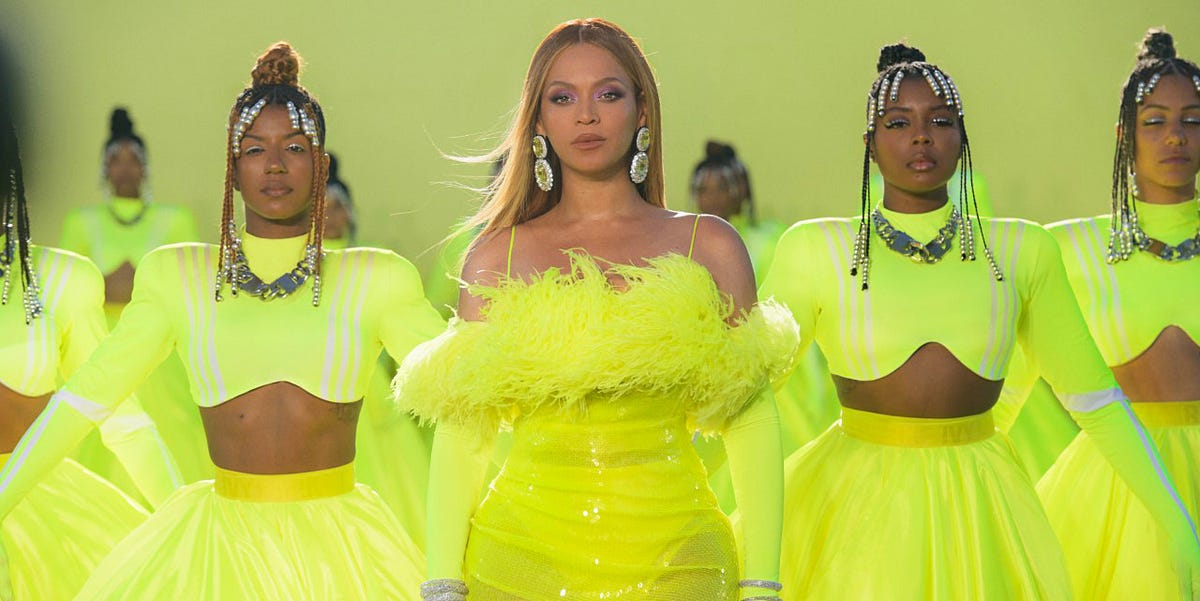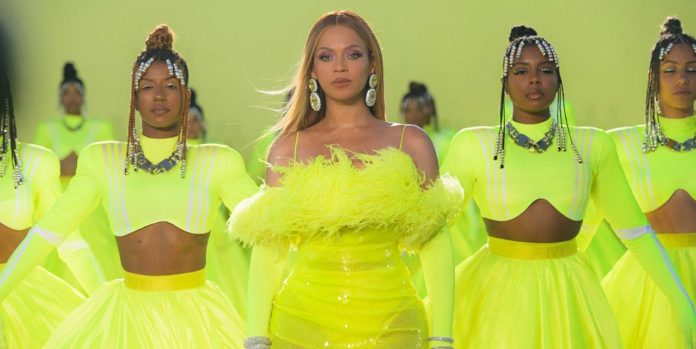
I’ve made it a rule to listen to any new Beyoncé music in complete isolation. My relationship with every song she has recorded is deeply personal and rarely understood by others. On Monday—having ducked out of dinner with friends early to stream the newest single from her forthcoming album, Renaissance, my listening booth of choice happened to be my compact SUV.
Intent on clocking every detailed nuance of the cut’s production, I sealed my car’s windows, and the opening battle cries of Louisiana MC, Big Freedia exhorting me to release all life’s burdens began boomeranging through my stereo system. Piano-anchored ʼ90s synth chords would follow, caressed by a breathy “la-la” riff that dissipated to introduce the infectious “You won’t break my soul” mantra. Soon, a verse bemoaning workday routines and embracing impromptu resignations tumbled into punchy rap declarations of “We back outside.” In seconds, they’d rev upward toward high-altitude mode modulations, carrying a gospel choir along for the ride.
This content is imported from Instagram. You may be able to find the same content in another format, or you may be able to find more information, at their web site.
At this point, the windows were all the way down, the volume was all the way up, and those walking by on Sunset Boulevard were being treated to a listening party too. What we were hearing was so vividly Black, so unapologetically gay; no doubt, deliberately telegraphed to the Beehive’s bedrock, queers of color who have rallied for their queen from day one.
What a time to be a “hive,” indeed. Though the pandemic is not over, June 2022 has found most major U.S. cities enjoying a return to what feels like those relatively carefree days of pre-Covid freedom. Wearing KN95 masks remains the exception at most of the month’s Pride parades, and social distancing has given way to hand daps that pull into robust hugs at Juneteenth festivals. “Break My Soul” gifts a dance floor love letter—steeped in the traditions of wailing house divas like Jocelyn Brown, Robin S., and Adeva—to those who claim both Black and queer identity. Though the omnipotence of Diana Ross’s “I’m Coming Out” can’t be denied, not since Aretha Franklin’s “Pride a Deeper Love” has a soul megastar’s sonic empowerment anthem felt so dialed in to the distinctly Black queer club music sound. We’ve got another drag performance standard on our hands here, but more intriguingly, it has arrived as culture verges on the long-overdue evolutions that would afford Black gay communities their proverbial seat at the table.
It’s a musical alchemy that channels uniquely triumphant tenacity, daring to prevail against any and all odds. When played at a Black gay club’s “1st Fridays” (celebrating each month’s least bill-diminished paycheck), dance floor vibes match Baptist revivals in conviction and feverish exaltation. Keeping that same energy, “Break My Soul” forges a hymn all its own, spotlighting Bey’s newest sermon on survival. Secrecy, apology, and second-class citizenship are cast aside to its soaring bars. Her Homecoming album cover of Frankie Beverly and Maze’s “Before I Let Go” commemorated the proverbial Black family cookout, but this time around, Beyoncé shows similar love to the Black gay club along with the “chosen families” it continues to foster.
“I’m tellin’ everybody!” its chorus of singers extols. The single’s release couldn’t be better timed; like the very month within which it debuted, here Beyoncé musically celebrates the sound adored by Black and queer individuals who publicly take up space, souls unbroken despite storms weathered.
This content is imported from YouTube. You may be able to find the same content in another format, or you may be able to find more information, at their web site.
How different that feels from when I was a teen navigating both my early adolescence and newly disclosed sexual orientation, as a Washington, D.C., high school student. In 10th grade, via a letter pinned to the bulletin board on the first day of classes, I informed the entirety of my all-boys, parochial school of my having come out to my family. But I didn’t need to post the note for many around me to locate my gayness; along with a flair for tricking out my school uniform, a penchant for female-vocal-driven house music scorchers consummately proved my “tell.”
Whether it was a trippy space transmission by Deee-Lite’s Lady Miss Kier, a high hat-tappin’ “la-da-di” by Crystal Waters, or a sonic steam engine fueled by the one-woman powerhouse that is Martha Wash, my appreciation for the way these women took the steering wheels of endless songs via their commanding voices posited me outside of that era’s heterosexual norms.
Life in the margins was not without its hard-fought and hidden blessings. In most major American cities, there existed a social “underground railroad” of belonging for Black gays looking to find both each other and an addictive beat to which we could shimmy and shine. New York had the Paradise Garage, Los Angeles had Jewel’s Catch One, and every city in between had its little rinky-dink version. Long before our endlessly co-opted wit and vernacular had saturated the digital dialogue, I found members of “my tribe” at the colorful Pop Stop cafe on Dupont Circle’s cruisy 17th Street and a few blocks west, upstairs at P Street’s crucial 12” Records. At these outposts, a cheap cup of coffee supplied a chance through copious observation to hone my then codifying gay-male language of style, or granted headphone-equipped turntables and hours of listening to rare-edition remix vinyls. While there, one might learn about a new night at Tracks (D.C.’s then reigning mega-club) or the Delta (a Black gay nightspot with unspoken codes of closeted-patron confidentiality).
AIDS, wrapped in a shroud of stigma-inducing mystery, was still mercilessly taking lives in that chilling duck-duck-goose manner, but these nightspots supplied pure escapism from that and other grim realities. They throbbed with house music’s uplifting melodies, so directly tapping of gospel’s church-rooted grandiosity yet ironically crafted for an audience that had too often been cast out of the congregation.
Don’t get me wrong: I may nostalgically cherish memories of those fake-ID-enabled nights at the club, but I’m thrilled to know new days are upon us; treatments that may effectively “cure” those infected with HIV appear to be on the horizon, and new-era parents like Gabrielle Union and Dwyane Wade increasingly embrace their Black children’s authenticity in identification, exceeding tolerance’s conditional brand of love to provide affirmation and—most inspiringly—empowerment.
While listening to this newly anointed song of summer 2022, it’s all enough to make this little-gay-Black-boy-cum-gender-presentation-non-conforming-Black-gay-man dance in the streets, and—much to his neighbors’ bewilderment—with “Break My Soul” looping on full blast, that’s just what I did that evening.
This content is created and maintained by a third party, and imported onto this page to help users provide their email addresses. You may be able to find more information about this and similar content at piano.io








